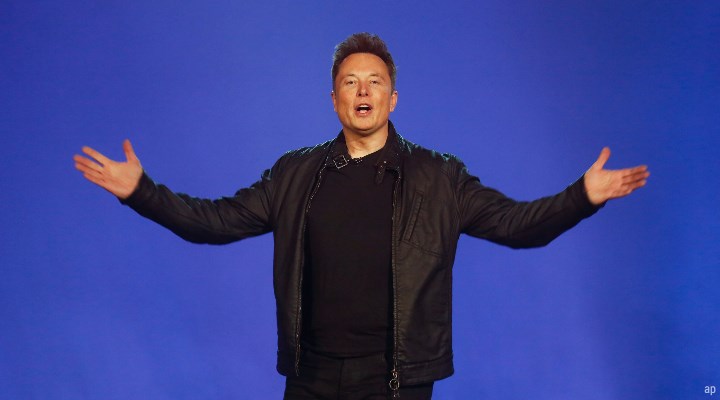
Elon Musk is now turning his Twitter (TWTR) sights on sustainable investing, calling it a "scam" after Tesla (TSLA) was given the boot from a widely-followed sustainability index.
But what Tesla’s chief executive is ignoring is that sustainable investing is more than about which companies produce environmentally-focused products, as Tesla does. The other two legs of the stool in "ESG" investing are social and governance issues, and that’s where Tesla comes up short.
S&P Global decided to boot the automaker from the sustainable version of its flagship S&P 500 index, citing the company’s weak handling of a federal investigation into multiple deaths linked to its self-driving cars and claims of racial discrimination and poor working conditions at its Fremont, California, factory.
S&P wrote that, while the autos and components industry had experienced an increase in its ESG score, which is a critical rating for a company’s sustainability, Tesla’s score was stable and had declined relative to its peers.
In reaction, Musk tweeted that the move came, “despite Tesla doing more for the environment than any company ever!” He also called ESG investing a “scam.” Ouch.
For its part, S&P noted it would regularly review Tesla and opened the door to its reinstatement “in years to come.” Tesla stock is down sharply since Twitter’s board accepted Musk’s offer to buy the social-media company and take it private, with Musk selling shares in the company to fund the buyout. Shares recently traded at a price of $709, below Morningstar’s fair value estimate of $750 per share. Sustainalytics, a sustainability data and analytics firm owned by Morningstar, gives Tesla a Medium ESG Risk Rating, citing weak product governance and other issues.
S&P’s action illustrates the ongoing tensions in the world of sustainable investing. As one of the largest makers of electric cars, Tesla should, in theory at least, have a high sustainability rating. But ESG ratings tend to focus on ESG risk—identifying what factors are material to a company and then incorporating them into an assessment of the shares.
That is different from their potential impact, or an investment’s effects on the wider world. To be sure, more impact measures are on the way. And many argue that companies incorporating ESG risk into their operations automatically start behaving like better corporate citizens.
Beyond the E
Then there’s the tension about whether these factors belong together in a single rating. After all, Tesla has much lower risk than legacy automakers on things like fleet carbon emissions or related regulation. It has pushed the entire global auto industry to focus on EV technology, and Tesla Energy is one of the largest solar-panel players in the United States.
For example, Sustainalytics notes that 89% Tesla’s revenues are related to climate action and that Tesla contributes to some of the United Nations Sustainable Development Goals. Most consumers think Tesla is about as green as it gets right now.
Nevertheless, growing emphasis by ESG investors on the interests of stakeholders is affecting the rating. Tesla has a poor record on labour issues and human capital. Recently, the California Department of Fair Employment and Housing sued the firm after claims from hundreds of workers that they were the targets of discrimination, including the use of racial slurs by co-workers.
Poor safety on its self-driving cars adds to Tesla’s ESG problems. In 2021, the US National Highway Traffic Safety Administration launched an investigation into crashes connected to Tesla’s “Full Self- Driving” autopilot software, covering more than 765,000 vehicles, and almost all its cars in China were recalled. In addition, Tesla hasn’t historically provided transparent reporting on carbon emissions, water use, or waste management practices.
Meanwhile, Musk, who owns about 15% of Tesla shares, is a frequent tweeter, and his comments affect Tesla's share price and expose Tesla to shareholder lawsuits and investigation. In 2018, he settled with the Securities and Exchange Commission after musing about whether he should take Tesla private.
As of last week, he's also facing allegations of sexual misconduct from a former worker at SpaceX, the aerospace firm he founded. His name also sits on the fringes of the biggest celebrity libel trial of all time, after he dated Amber Heard in 2016. All that has an impact, says Jon Hale, director of sustainability for the Americas at Sustainalytics.
“Tesla makes a product that will clearly help us transition to a low-carbon economy,” he says, “but the company does have other issues of concern to ESG investors in its product governance, labour relations, a racial discrimination suit, and corporate governance.’’
The biggest risk from all of this is to the company’s reputation, however.
“A big chunk of Tesla’s success is its reputational capital, as a company that helps with the climate problem,” says Driss Lembachar, who follows Tesla for Sustainalytics.
“Exclusions from indices highlight other problems on the social and governance side that may damage the reputational moat, or reputational capital.”
That risk grows “even greater” as Tesla expands, says Lembachar. This year, Tesla opened “giga-factories” in Texas and Germany. In the latter, unionisation traditions are stronger.
Listening to Investors
S&P’s move affects shareholders, including holders of Xtrackers S&P 500 ESG ETF (SNPE), which is based on the index. Tesla isn’t included in any of Morningstar’s sustainability indexes. “The selection process prioritising low ESG risk causes it to miss out on eligibility,” says Dan Lefkovitz, strategist for Morningstar Indexes.
For all that Musk has pushed back against shareholders, the firm is improving its sustainability, says John Streur, chief executive at Calvert Research & Management, the sustainable investment shop owned by Morgan Stanley.
“Tesla is a very aggressively run company, with massive ambition,” says.
“They’re driving positive change towards electrification globally, and they’re pushing every single car company in the world. They have all these challenges but put that in the context of the company at its stage of development.”
The company is responding to shareholders. Last year, a resolution filed by Calvert asking Tesla to provide more data about diversity, equity, and inclusion efforts won a majority of votes at Tesla’s annual meeting. This year, on Page 36 of its impact report, Tesla provided detailed EEO-1 data from its filings with the US Equal Employment Opportunity Commission.
“We don’t disagree that they have progress to make, but we see a lot of positive improvement,” Streur says.
Nia Impact Capital, a sustainable investment firm, also filed a proposal that fell just shy of majority support last year, asking Tesla to report on its use of mandatory arbitration, in which employees must submit to arbitration rather than bring their claims to court. Nia’s chief executive Kristin Hull says the firm has sold the bulk of its Tesla shares.
“We have a lack of confidence in governance and messaging from the top,” Hull says.
Nia retains some shares in its “activist portfolio” and intends to propose another resolution on mandatory arbitration in cases of racial discrimination. S&P’s move “for the broader [ESG] industry is really great. There’s accountability shown here. That shines a light on this conversation. Elon says ESG is a scam. What is it? Let’s have this conversation,” says Hull.
With research assistance from Alexandra McCallion











.png)










